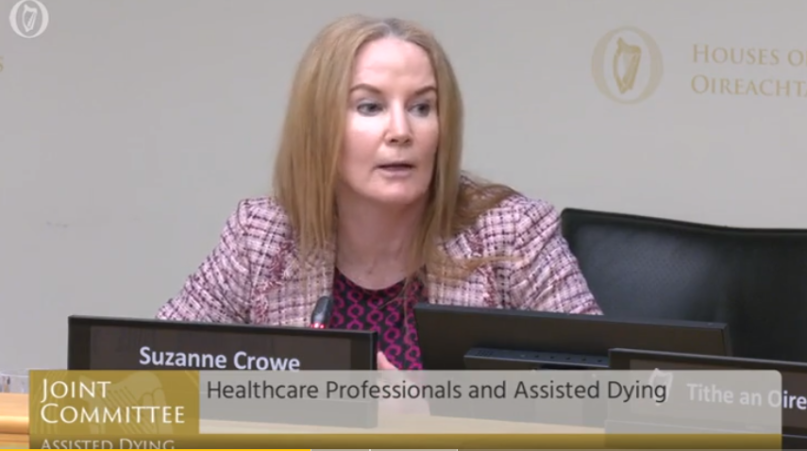
Dr Suzanne Crowe, President of the Irish Medical Council (IMC), appeared before the Oireachtas Committee on Assisted Dying on Tuesday and defended their extremely controversial decision to remove the prohibition on doctors deliberately ending a patient’s life from the Council’s ethical code.
She denied the charge that the move helps pave the way for euthanasia and asserted that the organisation has no position on the committee’s work as it falls outside the Council’s direct remit. But a body like the IMC ought to have a position on the deliberate killing of patients, surely? Why is the old prohibition no longer in the ethics code? Certanly the IMC agrees that the law can be unethical and can’t blindly follow it in all cases? She also admitted that the Council had not widely consulted doctors before it made the huge changes.
In the 2024 revision of the Guide to Professional Conduct and Ethics, the Medical Council made several alterations from the previous edition, including the removal of the phrase: “You must not take part in the deliberate killing of a patient.” Dr. Crowe explained that this change has misinterpreted, emphasising that the guide still mandates doctors to comply and operate within the law. But is this sufficient?
This decision has attracted criticism from several hundred doctors and also from Bishop Kevin Doran.
Senator Ronan Mullen queried Dr. Crowe about the rationale and process behind this significant change. She responded that the Council’s aim is to provide principles-based guidance rather than a legal code, suggesting that the specific line about not participating in deliberate killing was inconsistent with this approach. She also noted that references to specific treatments, such as assisted reproduction and ionising radiation, were removed to align more with conceptual rather than case-based guidance.
However, the removal of the prohibition on killing patients is not about specific treatments but relates to a fundamental principle of medical ethics that dates back to Hippocrates’ obligation “First, do no harm.” This foundational ethical tenet, emphasising healing over harming, has been a consistent feature in previous editions of the Medical Council’s code.
The deletion of such a significant ethical principle seemed to lack substantial justification, which Dr. Crowe appeared unable to provide. She admitted that while there was no specific consultation on this particular issue, there was a broader consultation on the overall content of the guide, although many doctors appear to have been unaware it was even taking place.
British ethicist David Albert Jones has observed that the new guide contains eight paragraphs on patient privacy protection, highlighting the depth of consideration given to certain aspects of medical ethics while seemingly overlooking the profound implications of removing a long-standing ethical principle from the Medical Council guide.
You would have to assume that if the law told doctors to violate patient privacy, the Council would object and denounce the law as unethical. This makes the removal of the prohibition on doctors killing patients all the more disturbing.
Nessun commento:
Posta un commento